
2023/2024
General Manager Daniel Alon



2023/2024
General Manager Daniel Alon

Renewable energy and especially wind power continues to be a top priority in European countries, and we are pleased to look into a future offshore wind market that equally so continues to be busy and with a demand for CBED’s specialised offshore CSOV and SOV services.
Back in 2008, CBED was a pioneer in this industry, and reducing our environmental impact has always been a priority for both us and for the industry. Since then, the energy efficiency agenda has truly gained pace and in CBED we have stepped up accordingly.
We know how important decarbonisation, reducing emissions and environmental impact are to our customers and we understand how they operate their businesses. In CBED we fully support this, and we therefore strive to support our customers
best possible, when they partner with CBED on their offshore projects. We of course do this through energy optimising our own operation, but equally important, also through guiding and making it possible for our customers to make more sustainable choices on everything from operational patterns to energy consumption and fuel types.
As such, sustainability is nothing new in CBED. But we are glad to now, for the first time, present a collected ESG report, presenting our priorities within not only the Environmental, but also the Social and Governance agenda.
Our ESG priorities
▪ Environment
We are committed to take part in the green transition by improving our own environmental impact and by decarbonising our fleet and preparing to meet the IMO climate targets by 2050.
▪ Social
CBED has a strong commitment to providing a healthy and safe working environment for all our employees and customers and ensuring the health and safety of those who work with us. We embrace the diversity of
people, backgrounds and perspectives to attract and develop talent that can strengthen our business and form the backbone of sustainable evolution. This is why we always have, and will continue to, put health and safety, inclusion, equal opportunities for everyone and opportunities for development high on our agenda.
▪ Governance
CBED operates in compliance with all current legislation through our certified safety management system and operation. Our work is rooted in our strong company culture based on open dialogues, trust and transparency.
In this ESG report 2023/24, you can learn more about our initiatives under the ESG agenda, and the progress we have made through 2023 and the beginning of 2024. During the process of developing this report and in preparing for the next, our focus has been to initiate a larger strategic work on how we can meet the coming demands of the EU’s Corporate Sustainability Reporting Directive (CSRD).
Governing our Responsibility efforts
When it comes to governing ESG developments, CBED is part of Monjasa Holding A/S’s steering committee spearheading our work under the ESG agenda. This steering committee
includes Group Responsibility Director and Managing Director for CBED, Jesper Nielsen, and Monjasa Holding A/S’s Executive Management with Group CEO, Anders Østergaard, and Group CFO, Rasmus Ravnholdt Knudsen.
Monjasa Holding A/S’s Board of Directors oversees our overall ESG ambitions and reviews and approves the annual ESG Reports.
Enjoy the read!
General Manager, CBED Daniel Alon
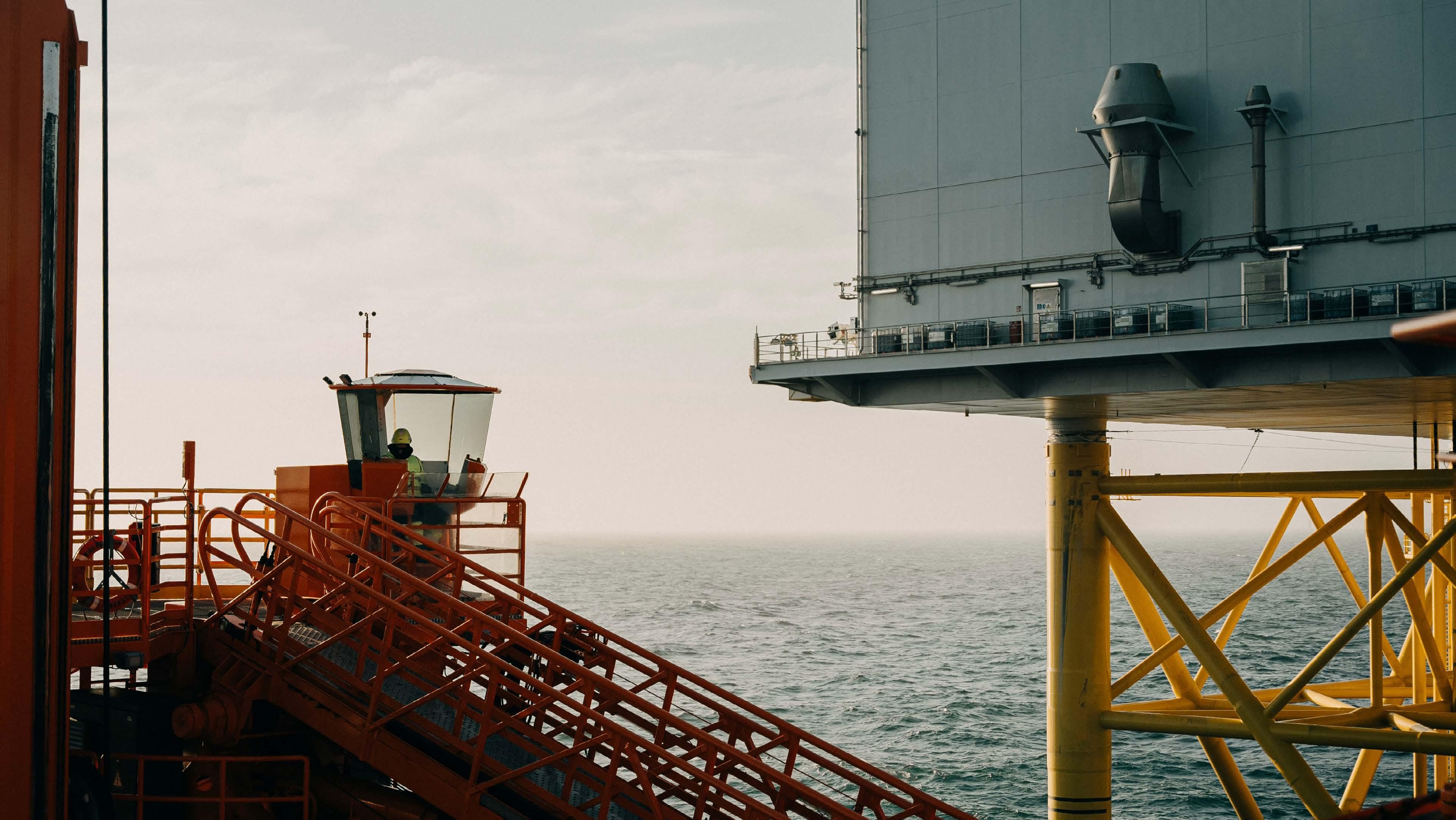
11,280
11,054,400
MW of renewable energy produced with the support of CBED since 2008 households running on renewable energy as a result
1,671
37 gangway transfers in 2023 individual offshore projects since 2008
111
0.0 onshore and offshore employees in 2023 Lost Time Incident Frequency Rate in 2023
In 2023, CBED conducted its first double materiality assessment (DMA) to keep better track of our stakeholders’ expectations and align expectations in a fast-changing world. The DMA is developed in accordance with the EU’s Corporate Sustainability Reporting Directive (CSRD). As part of the Monjasa Group, this DMA and the underlying analysis to develop it serve as the foundation of CBED’s DMA. However, a few topic matters have been re-prioritised to better align with the offshore energy industry in which CBED operates, as well as the specific stakeholders that we do business with.
An ESG topic is material if it meets the criteria of double materiality from either an impact perspective or a financial perspective, or from both perspectives. We can thereby determine, act and report on those areas where CBED has a significant impact on society or the environment, and where issues may pose significant risks or opportunities to our business.
Aleksandr Prokofjev and Kalle Karner
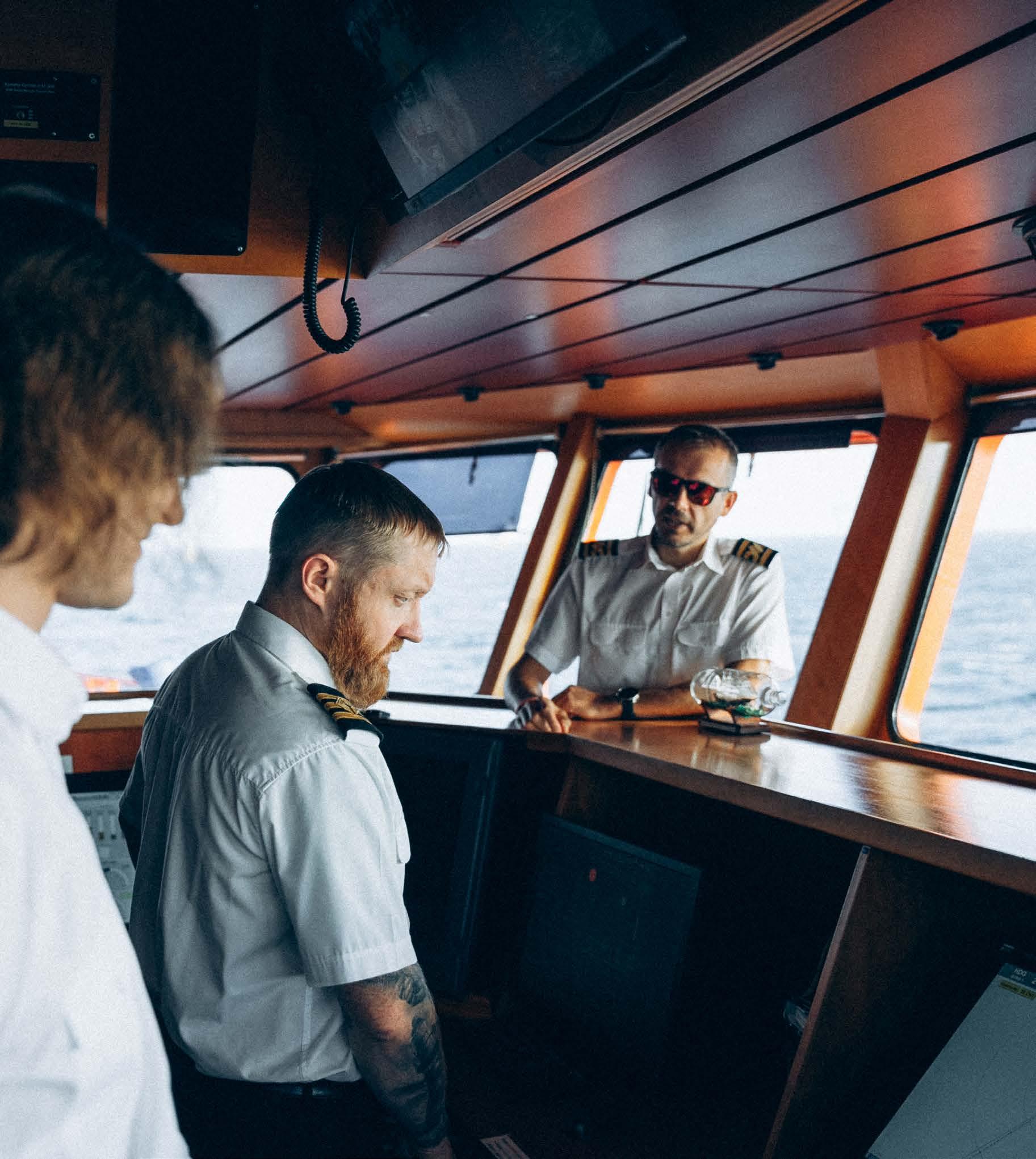
We identified six stakeholder groups when establishing our DMA: customers, colleagues, suppliers, industry peers, authorities and investors. The views expressed by each stakeholder group on the various topics were assessed through desktop research and interviews with stakeholder representatives.
Upon drawing up a long list of material issues, our ESG topics were identified, using the draft European Sustainability Reporting Standards (ESRS) 1 General Requirements and the SASB Marine Transportation Standard as inspiration.
This produced a gross list of 39 ESG topics, from which 10 topics were deselected as they were deemed not relevant to our business model and value chain. The remaining ESG topics were then scored according to the criteria in the ESRS 1 General Requirements and resulted in the list of topic matters of high risk to CBED presented in the DMA.
Having completed the DMA, we will focus on unfolding our ESG ambitions and set targets and metrics for the topics in 2024. Our priority will be the topics with the highest risks and those that have reporting requirements in 2026.

CBED’s core business is the supply of Construction and Service Operation Vessels to the offshore energy industry. We offer a tailor-made concept allowing extensive accommodation, storage and office facilities for projects across the offshore wind and oil & gas industries.
Concession & Permits Concessions
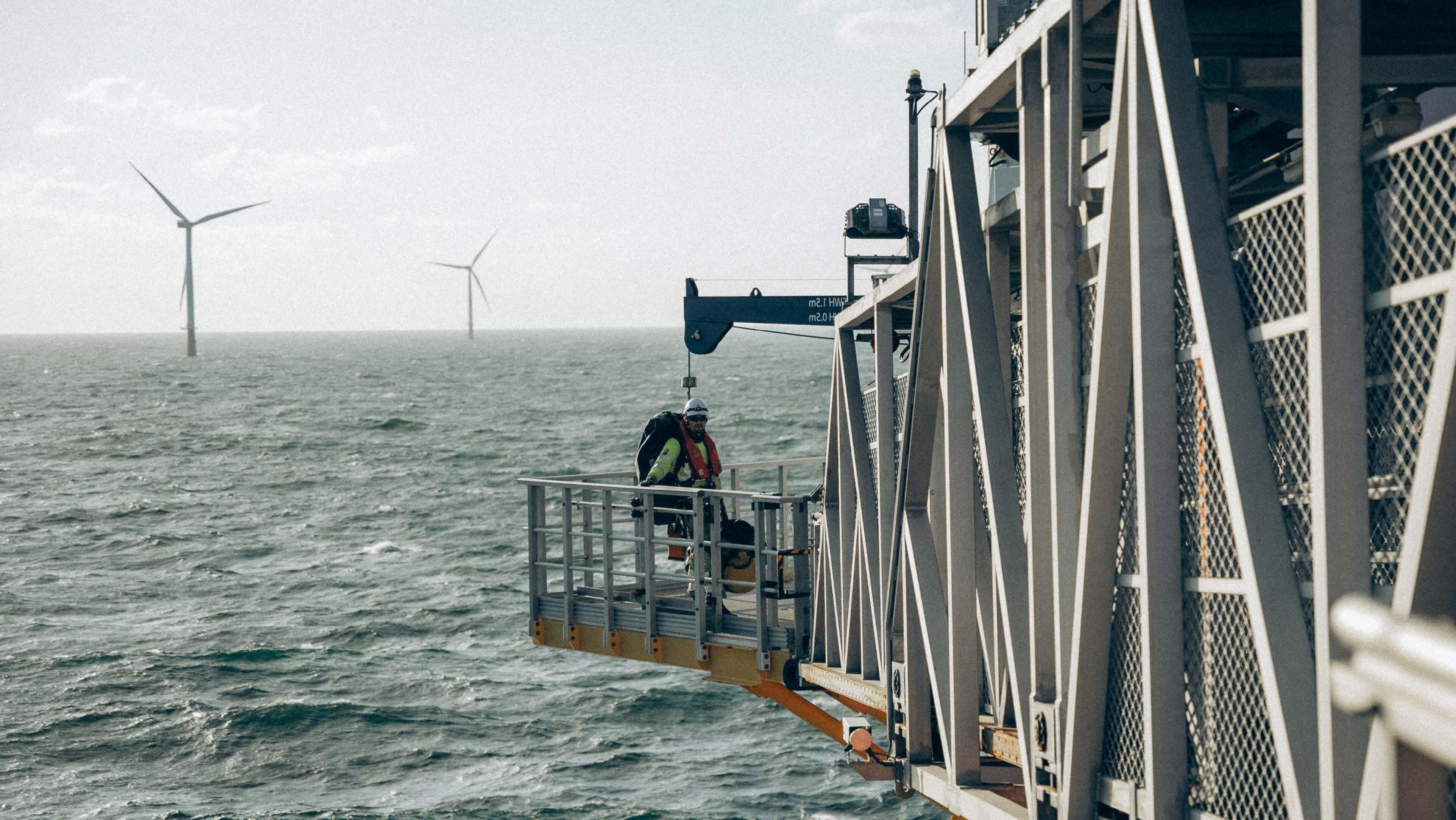
Credible carbon accounting provides us with a clear overview of our emissions and is the foundation for minimising our environmental impact and setting targets for decarbonising our vessels and office.
CBED has reported full-scope 1, 2 and 3 emissions for our carbon accounts since 2020. This reporting adheres to the GHG Protocol, which classifies both direct and indirect emissions into three scopes.
Managing our direct impact
Total carbon emissions for 2023 amounted to 11,569 tonnes CO2 eq, of which direct scope 1 emissions were 9,409 tonnes, scope 2 emissions were only 4 tonnes and scope 3 emissions accounted for 2156 tonnes CO2 eq. CBED’s scope 1 and 2 emissions thereby constitute 81.4% of our total emissions with 81.3% and 0.032% respectively. The remaining 18.6% link to scope 3 and is predominantly made up of product life cycle emissions from supplier production. When compared to the previous year, the total emissions represent a decrease of 36%.
A decrease of 26% was noted in scope 1 emissions, however, this is attributed to a relatively high number of days in port during 2023 compared to 2022 due to the following factors:
• A gap in contracts from January to March as well as from the end of October to the end of December
• Dry dock
• The client’s choice not to utilise the vessel 24-7, but instead a 14-hour schedule daily
While CBED has implemented energy optimisation initiatives to reduce fuel consumption, the main driver for emissions reductions has been the relatively higher days in port which resulted in daily average consumption of 7,9 t/day compared to 10.64 t/day observed in 2022. Efforts have also been made to ensure energy optimisation while in port, mainly by focusing on utilizing shore power.
A decrease of 61% was also noted in scope 3 category 3 emissions reflecting an update in emission factors applied to the calculation.
Total CO2 eq Emissions 1,000 tonnes CO2 eq
Scope 1
Direct emissions from operations owned by CBED such as fuel consumed from our owned vessels and cars.
Direct emissions
9,409 (tonnes CO2 eq)
Scope 3
Indirect emissions that occur in CBED’s value chain.
These include emissions from subcontractors, however, this scope is primarily composed of product life cycle emissions from supplier production.
Indirect emissions
2,156 (tonnes CO2 eq)
Scope 2
Indirect emissions from the generation of purchased energy consumed by CBED.
For instance, this pertains to heating and cooling systems, and the electricity we purchase for office use.
Indirect emissions
4 (tonnes CO2 eq)
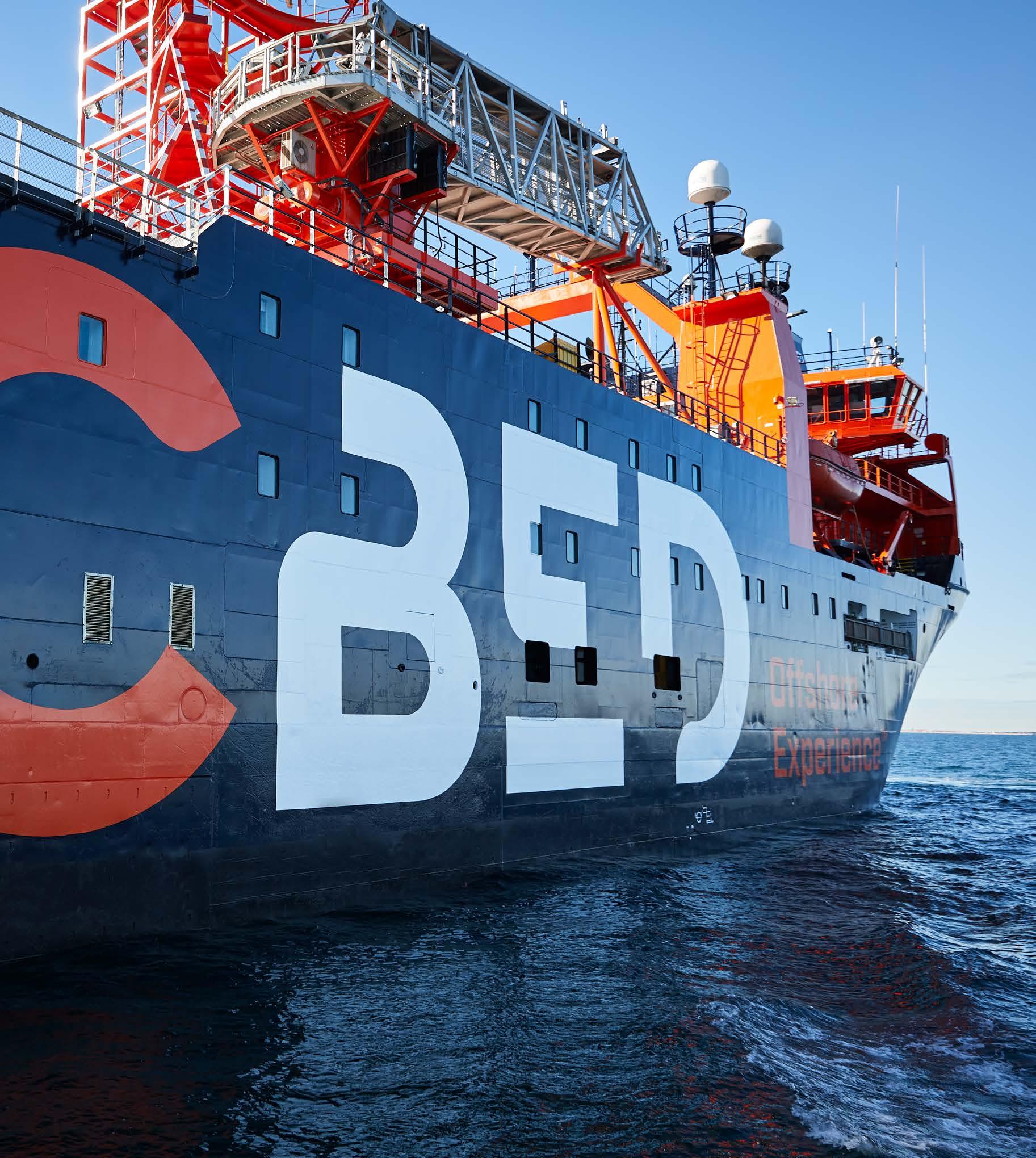
CBED has been working with energy management for a long time, but in recent years, the energy efficiency agenda has truly gained pace. In an era marked by heightened environmental awareness and regulatory pressure, the transition to a low-carbon fleet is no longer an option - It is an imperative. We stand together with the offshore energy industry in recognising the urgency of decarbonisation and are committed to moving towards net zero fleet emissions in 2050.
Regulatory framework
Climate change measures on an international scale are necessary to facilitate a level playing field where the industry moves collectively towards more sustainable maritime operations. Therefore, CBED endorses the 2023 International Maritime Organization (IMO) GHG Strategy and its increased ambitions, and we aim to be fully compliant with the 20% reduction of total annual GHG emissions by 2030 for our fleet.
We acknowledge the challenging work ahead within the IMO’s Marine Environment Protection Committee to translate the strategy into a tangible basket of mid-term measures, and we follow these developments closely to ensure that our fleet is compliantly navigating the transitioning industry.
To help us navigate the way towards net-zero emissions from our fleet, we have developed a long-term roadmap (page 14) detailing key steps and initiatives in this process.
In alignment with the 2023 IMO GHG Strategy, our objective is to achieve a 40% reduction in CO2 emissions per transport work by 2030. Our approach involves assessing our vessels individually based on fleet-level targets. Our fleet’s energy efficiency is reviewed on a yearly basis to identify where we can improve our operations to continue meeting the GHG reduction requirements from IMO.
our consumption
We continuously measure fuel consumption on board all vessels in our fleet to identify potential areas of improvement. This is done through a digital solution where Management on our vessels produce a monthly Energy Review Report and through this get notified if consumption exceeds or reduces by more than 20% of the expected consumption. Our technical department and crew are in close dialogues on any discrepancies with the expected data.
Combining this fuel consumption data provides us with in-depth insights to how much energy our vessels use in different operational situations and allows us to optimise our operation to the lowest possible energy consumption, depending on for example whether we are in port, at anchor or in DP2 position.
Since 2014, CBED has been certified according to ISO 50001. As part of this, CBED has already been committed to monitor and continuously improve consumption in our operation for the last decade. For example, CBED installed DESMI converters on Wind Innovation in 2020 which resulted in reducing overall energy consumption by 5% on board the vessel.
During 2023, CBED installed a hot water accumulator tank, or a thermos, for the boiler on board our vessel Wind Innovation. We already reuse heat generated from the engines to produce hot water for household use on board the vessel (showers, restaurant, etc.), but with this new thermos solution, we prolong the period with hot water as it can be stored even after engines are turned off. We have thereby optimised the solution for our operational pattern where hot water for e.g. showers are primarily needed after operation is done and engines are shut down.
During 2023, we also dry-docked Wind Innovation to blast and repaint the hull to remove any debris that may incur drag and lower efficiency when sailing.
Overall, these initiatives formed part of CBED’s reduction in scope 1 emissions from 2022 to 2023.
Looking ahead
In 2024, CBED welcomed two new vessels to the fleet
which are newer and more energy efficient than our existing vessel. At the same time, both vessels were dry-docked as soon as we took over ownership to initiate energy efficiency optimisations before starting operation on the first project for CBED.
Looking ahead, we continue to look for new decarbonisation initiatives in close cooperation between CBEDs technical department and crew, our technical partner, Transnautic and our engine supplier. As an example, we are looking into a new hybrid study where one of the auxiliary engines is replaced with a battery which will result in more efficient use of engine capacity for CBEDs operational patterns.
At the same time, we are preparing our fleet to connect to shore power during port calls and offshore charging points during idle periods to reduce fuel consumption and replace with a greener energy solution, when the infrastruture is mature.
We are also preparing our fleet to run on alternative fuels such as biofuel and e-methanol as part of our long-term decarbonisation plan.
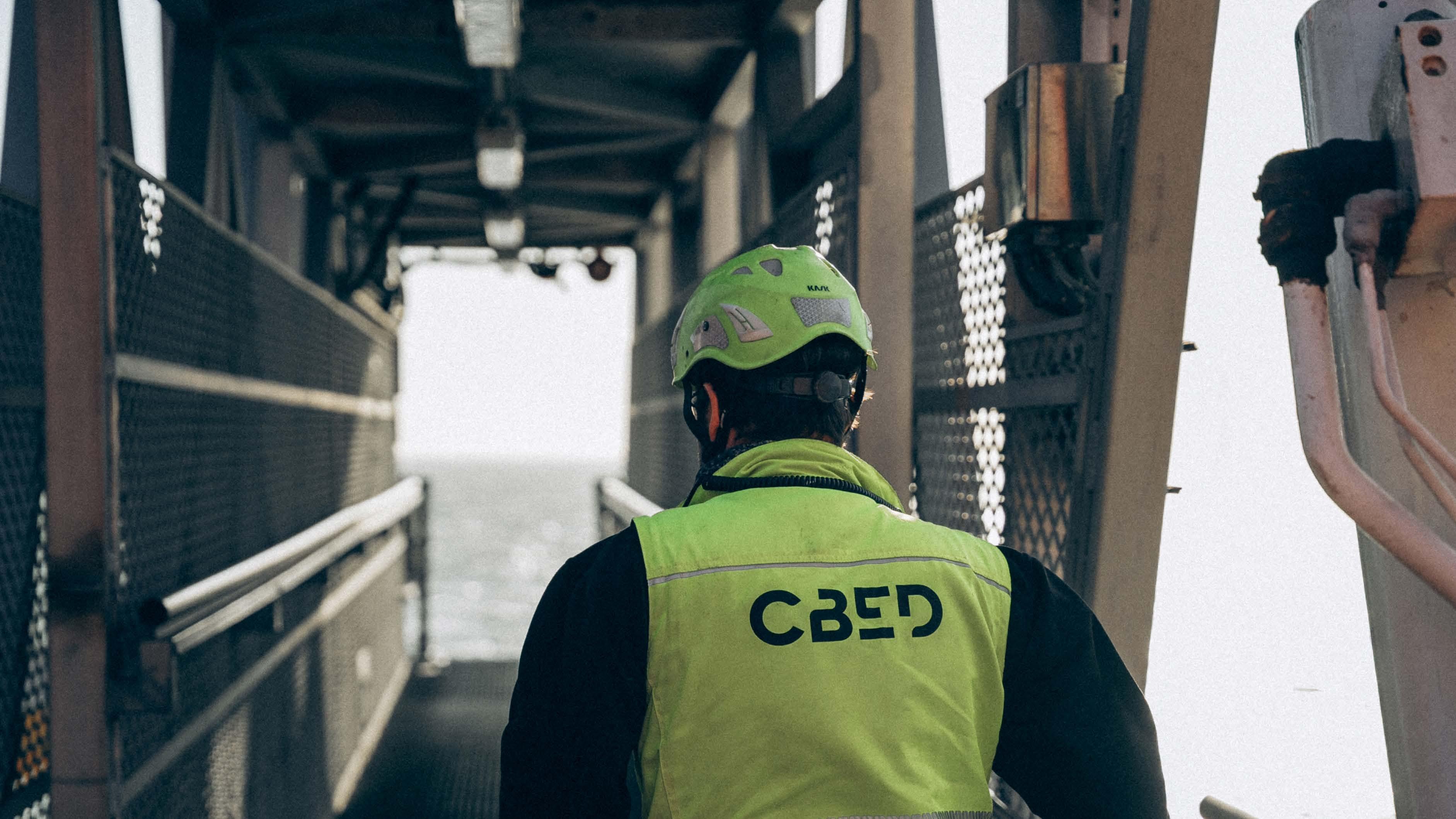
Total emissions:
11,569 tonnes CO2 eq
▪ Influence customer planning to utilise the vessel in the most efficient way
▪ Data-driven optimisation of fuel efficiency
▪ Fuel reduction initiatives
▪ Focused on optimising load on engines
▪ Converting cooling and ventilation systems to DESMI system for a more energy-efficient solution
▪ Utilising surplus heat from engines for household heating onboard our vessels
▪ Improving office- and vessel-related energy consumption in line with ISO 50001
▪ Engaging with our supply chain to minimise environmental impact
▪ Fleet expansion or conversion to more fuel-efficient vessels
▪ Optimisation of existing vessels
▪ Hybrid
▪ Shore power during port stays
▪ Biofuels
▪ Investigate opportunities for fleet expansion via newbuilds
▪ Low-emission designs
▪ Operating on low-carbon fuels/biofuels
▪ Outphasing older tonnage
▪ Existing CSOV’s to be converted into biofuel or other low-carbon fuels
▪ Newbuilds designed for zero-emissions
▪ Total fleet to operate only using biofuels or other low-carbon fules and battery systems
SOV Wind Innovation
Port of
93,4m Breadth 22,0m Draft 7,0m (max)
SOV Wind Creation
SOV Wind Evolution Port
18,4m
80 client-dedicated single rooms (105 beds) with own bath/toilet, internet, TV, desk, wardrobe
Facilities
DP2, compensated gangway, boat landing, offshore bunkering, info/reception, restaurant, game room, fitness room, conference room, cinema/briefing lounge, 2 x charterers office
41 client-dedicated single rooms (60 beds) with own bath/toilet, internet, TV, desk, wardrobe
Facilities
DP2, compensated gangway, offshore crane, boat landing, offshore bunkering, info/reception, restaurant, game facilities, fitness room, conference room, cinema/briefing lounge, 3 x offices, 1 x sky office
41 client-dedicated single rooms (60 beds) with own bath/toilet, internet, TV, desk, wardrobe
Facilities
DP2, compensated gangway, offshore crane, boat landing, offshore bunkering, info/reception, restaurant, game facilities, fitness room, conference room, cinema/briefing lounge, 3 x offices, 1 x sky office
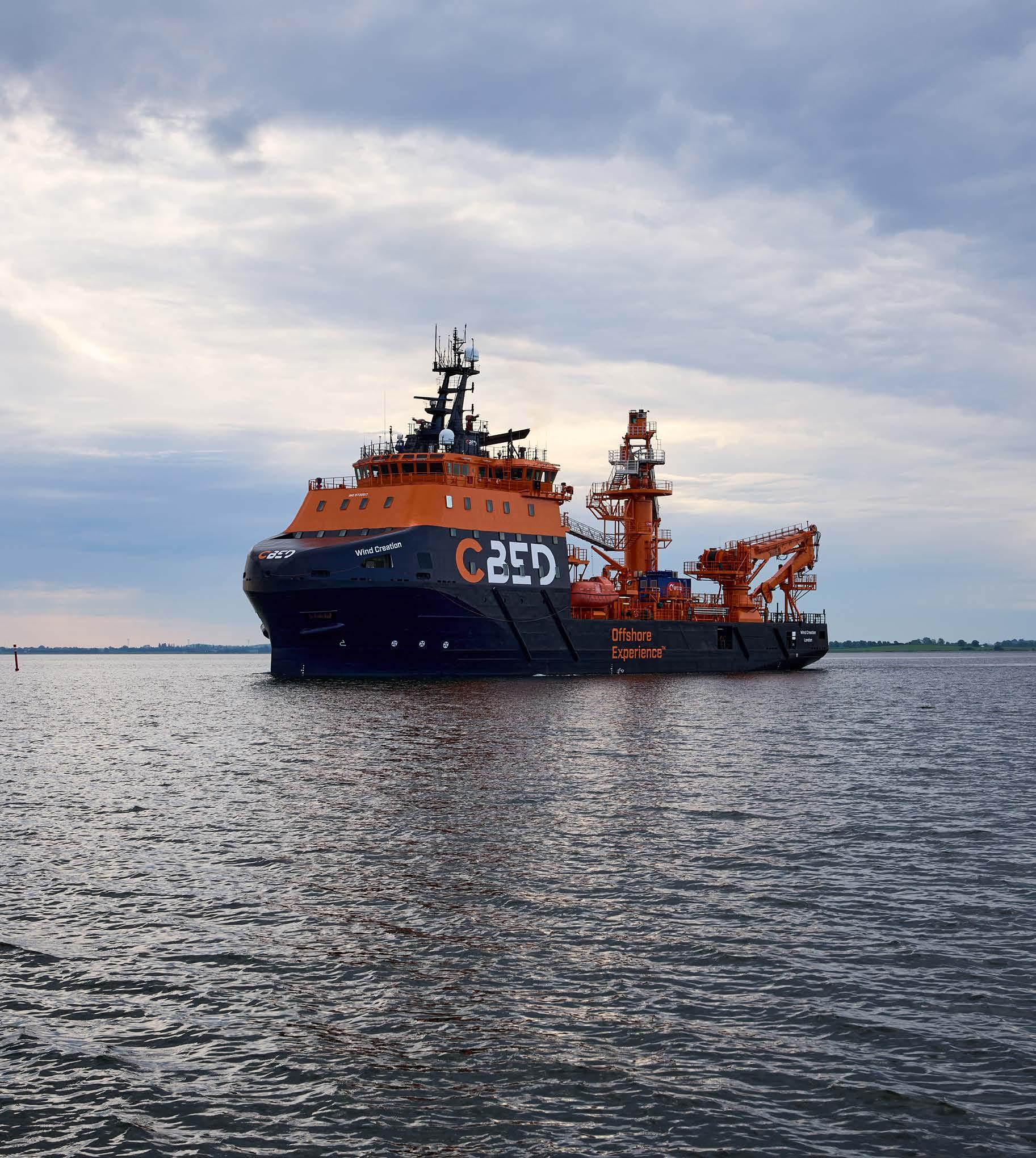
Operating in the maritime industry, CBED recognises that our operation leaves an impact on the environmental surroundings. We actively work to minimise this and follow all regulations and guidelines to keep our impact as low as possible. We also want all employees and partners to feel a personal commitment to minimising local environmental impact and proactively work with both crew and customers on board our vessels to increase awareness of how they can contribute.
Being well-prepared for any environmental pollution is an integrated part of our certification to ISO 14001 and the International Safety Management (ISM) system. CBED adheres to all rules and regulations, and it continues to be our focus to have zero oil spills from our operations.
All CBED vessels are equipped with oil spill prevention and cleaning equipment and have a Shipboard Oil Pollution Emergency Plan (SOPEP) manual to create complete clarity on roles and responsibilities for our crew. To make sure CBED’s operations are prepared to manage a potential oil spill, we take an active approach to conducting quarterly drills in collaboration with our subcontractor on technical ship management, Transnautic, and local maritime authorities.
During 2023, we achieved our target of zero oil spills.
All waste onboard CBED’s vessel is segregated and disposed of for recycling according to the Convention for Prevention of Marine Pollution (MARPOL) and the Garbage Management Plan. Every month, our vessels report their amount of waste divided into categories to our HSEQ department who then keeps track of our waste and how we can reduce our waste in the food and plastic categories.
During 2023, CBED generated 303.71 m3 of waste compared to 321,44 m3 in 2022. Operational waste accounts for 18% of total waste for CBED and includes customer waste from offshore projects. Food waste accounts for 20.8% and is one of the categories where CBED has the highest influence on minimising.
To increase awareness of how to reduce waste and sort correctly, we continuously run waste campaigns onboard our vessels with changing focus. In 2023, our waste campaigns focused on reducing food waste and this continues to be our focus looking ahead. The average food waste per person was 0.08 m3 in 2023 compared to 0.10 m3 in 2022.
In 2023, CBED installed a ballast water treatment system on Wind Innovation to ensure that all ballast water is treated before being discharged.
In line with the IMO Ship Recycling Convention, CBED keeps inventory of all hazardous materials onboard our vessels.
As such, our Chemical Management system contains data sheets for each hazardous material, including how to handle and correctly dispose of it.
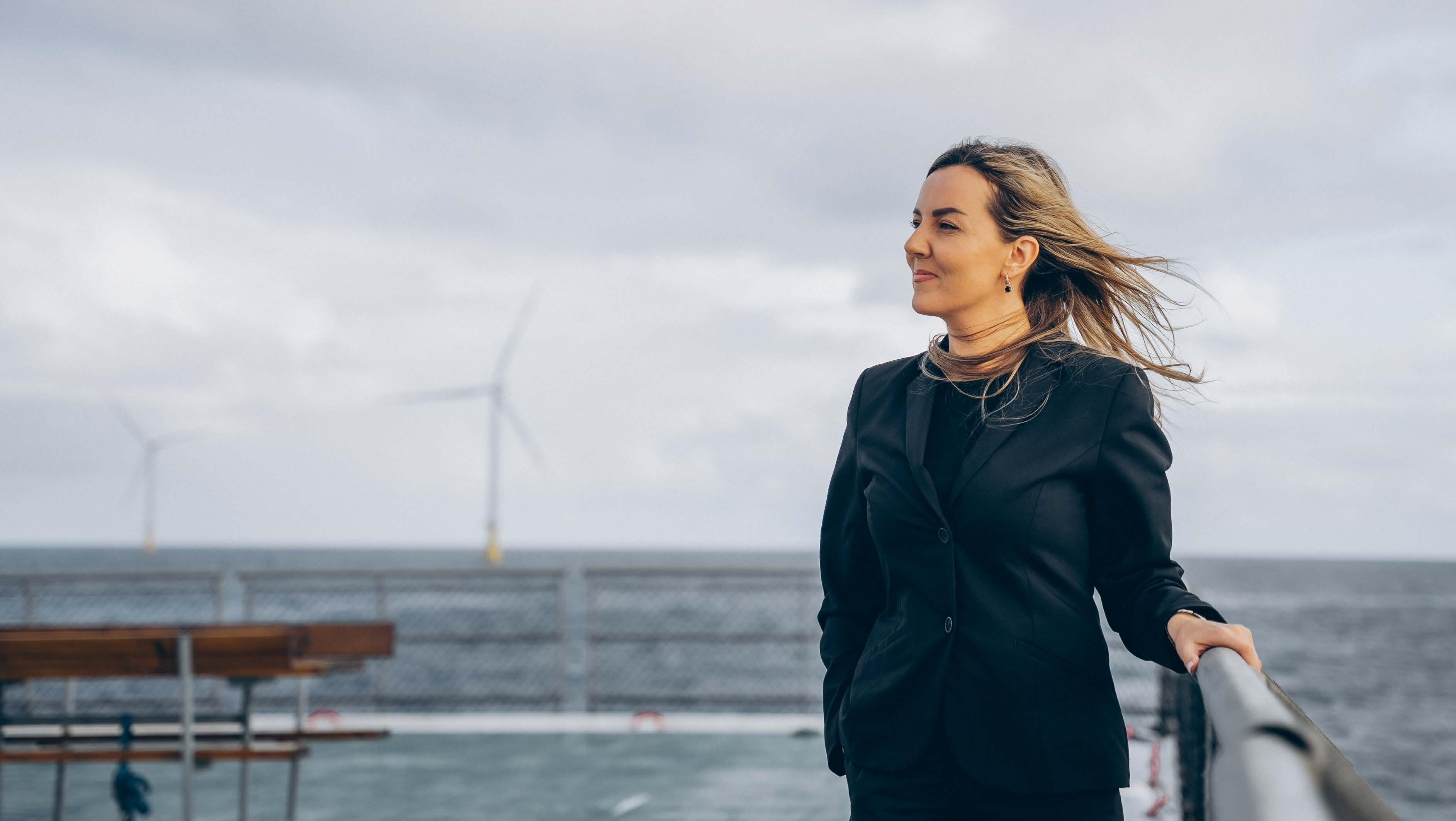
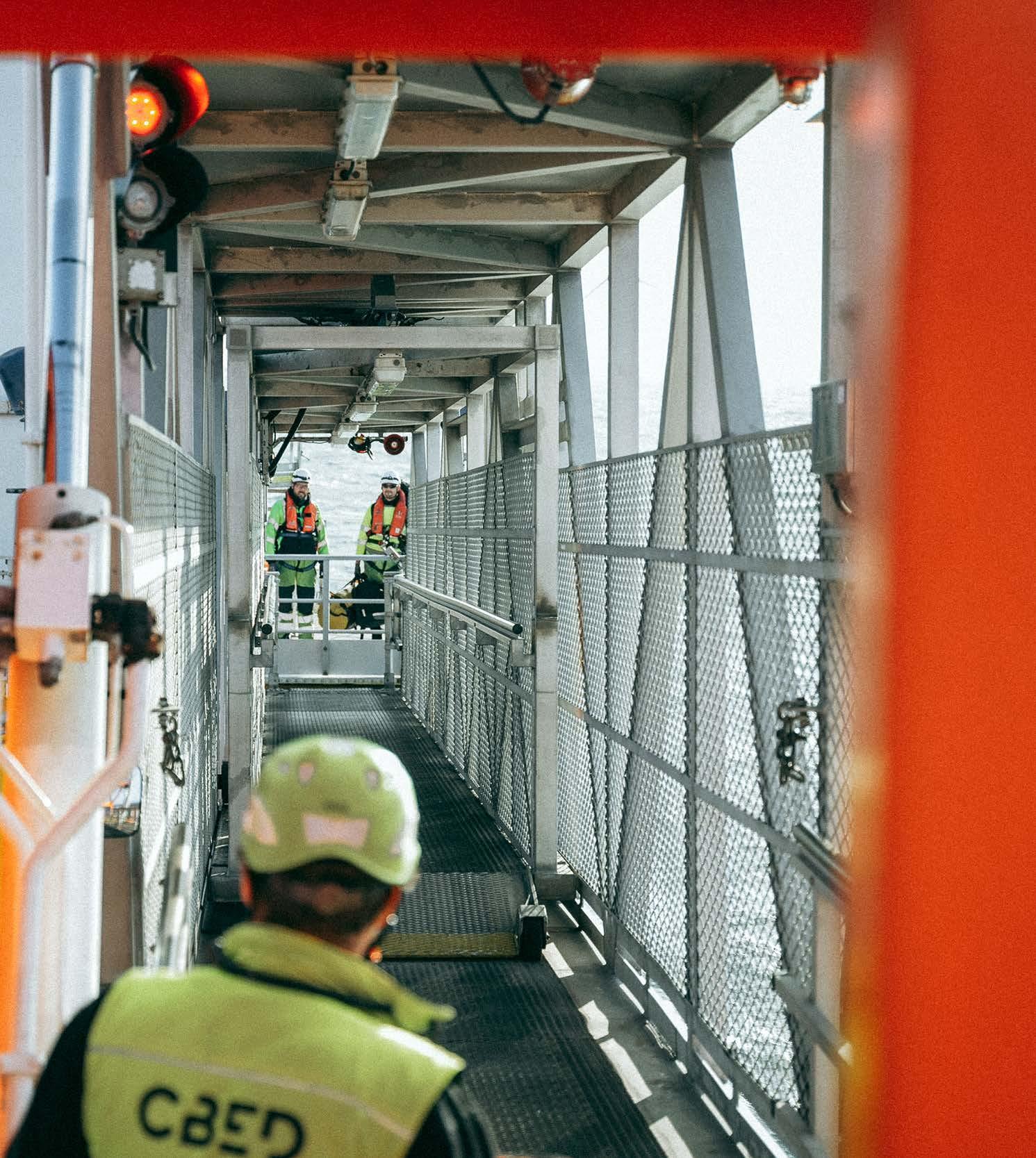
CBED has a strong commitment to providing a healthy and safe working environment for all our employees and ensuring the health and safety of those who work with us.
We operate an Integrated Management System certified to ISO 45001:2018 to enable us to achieve these commitments across our operations and offices.
On board our vessels, CBED keeps focusing on the International Safety Management (ISM) vetting, as well as passing Class and Flag inspections. Not only to obtain the highest possible quality certifications for onboard health and safety, but at the same time to exploit these occasions to maintain the high HSEQ awareness among our crew throughout the year.
Instant reporting with HSEQ app
We constantly optimise our safety processes to ensure that the right precautions are taken and along with many other areas, digitalisation is pushing positive developments within health and safety too.
In 2022 we launched an HSEQ app to foster and encourage a culture of safety by making it easier for our crew to instantly report HSEQ-related incidents such as hazards, incidents, near-miss incidents, and non-conformities or provide feedback to our HSEQ department.
With reporting as the foundation of an effective safety culture, the data from the HSEQ app helps us monitor different risk areas within our operations.
The valuable data provided allows us to implement datadriven initiatives and improvements and helps us evaluate the effectiveness of the controls in place.
CBED’s Hotel Managers and Masters have access to the app and are responsible for reporting on behalf of both crew and customers onboard their vessel. All incidents are investigated, so corrective measures and actions can be implemented.
CBED cooperates closely on all health and safety matters with our long-term subcontractor, Transnautic Ship Management. Transnautic is responsible for the daily operation of our ISM-certified Safety Management System and in close cooperation with our crew, our HSEQ department, and our technical department, ensures that
all regulations are adhered to and that our crew is trained to and educated on ensuring a safe and healthy working environment onboard our vessels.
CBED takes a proactive approach to health and safety by promoting a safety culture among both crew members and customers onboard through continuous safety awareness campaigns. As such, all new crew members and customers boarding our vessels go through a safety familiarisation video as one of the first things to introduce them to all safety rules and procedures on the vessel.
We do our utmost to motivate and provide our employees and crew with the knowledge and capacity needed to understand and follow safety and health working routines and take responsibility for acting in all matters related to their own and colleagues’ safety.
We have a yearly KPI of zero Total Recordable Incidents and Lost Time Incident Frequency. In addition to this, we set new
yearly targets on health and safety to ensure continuous improvements. To heighten the sense of responsibility and engagement with our crew members, they are involved in setting these yearly targets and the specific areas we choose to focus on.
We are very proud to see how this approach has resulted in a very high level of engagement and a strong safety culture onboard our vessels.
As an example, each month our crew nominate their colleagues as “Safety Lions” to reward them for being good role models or going the extra mile to improve safety on board. During 2023, 8 Safety Lion awards where nominated by colleagues. In addition, as part of a slip-and-trip campaign, the crew onboard CBED’s vessel Wind Innovation independently mapped all decks for potential risks and implemented preventive measures, a practice that is now included in CBED’s Planned Maintenance System.
As part of our Safety Management System, CBED performs risk assessments for all critical processes and work and serves as the foundation for all work procedures onboard our vessels. To increase awareness of these risk assessments and ensure daily operational safety measures, CBED recently developed a Risk Assessment pocket folder to encourage crew to consider risks before conducting any type of work.
All risk assessments and procedures are reviewed yearly by department managers onboard.
CBED also has a stop-work procedure encouraging and authorising everyone onboard to stop any type of work if they encounter something they deem unsafe or a risk.
CBED has an objective of zero personal injuries onboard our vessels. All incidents must be reported to crew management and our HSEQ department and all reports are investigated thoroughly to learn what caused the incident and prevent further incidents. In addition to gathering this data, CBED also investigates any trends in incidents to determine any correlations in root causes which should be improved.
During 2023 we had a Lost Time Incident Frequency Rate of 0.0 and four recordable incidents corresponding to a Total Recordable Incident Rate of 23.24.
Vagn Olufsen

CBED performs yearly crew engagement surveys to ensure the well-being onboard our vessels. While the surveys are anonymous, all results are collected and processed by our HSEQ department to ensure that all feedback is followed up on to ensure continuous improvements on well-being.
In 2023, general job satisfaction in CBED remained steady at a satisfactory 8.3 out of 10 (2022: 8.3). The total score for teamwork between colleagues was 9.0 (2022: 8.9) while 8.2 out of 10 answered that they would recommend CBED as a workplace to their network (2022: 8.1).
Going forward, CBED’s focus is on eliminating all kinds of bullying on board our vessels as we have a zero-tolerance towards this. CBED already has a nondiscrimination and anti-harassment policy in place which we will continue to raise awareness of, as well as ensuring a culture where our crew feel safe to speak openly and report cases.
Talent attraction and retention
CBED uses Crewplanet as a subcontractor for hiring crew onboard our vessels and conducts yearly audits of their procedures to ensure they live up to CBED’s guidelines and procedures. During 2023, CBED hired 42 new crew members, ending at a total of 108 offshore employees. The overall retention rate in 2023 was 66%, with the engine rating department having the highest retention rate of 80%.
To ensure that our crew members want to continue working for CBED we offer internal rotations and promotions where possible to ensure our crew members continued development. In 2024, CBED added two new vessels to the fleet which increased our opportunities for offering this to our crew.
In 2023, CBED ended the year with three onshore employees and a retention rate of 75%.
Closer to home with Starlink
During 2023, all CBED vessels were equipped with Starlink, a satellite internet connection comparable to a 5G, ensuring that all our vessels are online no matter where in the world they are.
Starlink significantly improves the welfare of both crew members and customers on board our vessels by bringing them closer to family. With faster and more reliable internet access, they are now able to send pictures to their families through WhatsApp and have video calls via Teams.
We believe that being an attractive workplace that offers an inclusive working environment where everyone can bring their whole self to work, is part of what it means to be a responsible and sustainable business.
We also believe that diversity, equity and inclusion promote a sustainable evolution of our company by harnessing diverse perspectives, increasing innovative thinking and shaping holistic perspectives when navigating and responding to current and future challenges.
An inclusive organisation is an important part of cultivating a healthy work environment in CBED, where our people, regardless of differences, feel welcome, valued, and thrive. Our company values strive to offer an environment where everyone is treated with dignity and respect and provided with equal opportunities. We do not tolerate bullying or harassment of any kind. We have a duty of care to protect our employees – as do our suppliers for their employees.
CBED remains steadfast in our view that the most competent and suitable candidates must always be selected, and we expect our subcontractor, Crewplanet, to live up to these same values.
In 2023, the female representation of our crew was 15% and among offshore management, the female representation is 31%. For onshore employees, the female representation was 0% in 2023. Going forward, it continues to be our focus to
have a balanced gender representation as well as diversity among our employees in general.
Looking at our Board of Directors, we had a balanced gender representation with one female and three males in 2023. As we welcome new members to the board, our ambition is to continue this balanced representation between genders with a firm target of at least 40% of the underrepresented gender by 2032.
Safeguarding against modern slavery is not just a legal obligation, it is a moral imperative. In 2023, we therefore implemented a Modern Slavery Policy in alignment with the UK Modern Slavery Act 2015.
Upholding our commitment to ethical practices, we are dedicated to respecting human rights across all our business activities. We want to eliminate the risk of modern slavery, human trafficking and forced labour within our business operations and throughout our supply chain.
In 2023, we therefore implemented a Modern Slavery Policy, outlining the steps that we have taken to implement and
maintain measures ensuring that this does not take place within our business and to make all colleagues aware of the risks.
Procedures safeguarding against modern slavery
Regular risk assessments are conducted and before we engage in any transactions, we conduct due diligence on all our suppliers to proactively identify any potential risks associated with modern slavery.
Simultaneously, we place emphasis on employee education to raise awareness about modern slavery, empowering our workforce to recognise and report any concerns.
During 2023, we also updated our Code of Conduct to include modern slavery as we expect our suppliers to uphold similarly high standards regarding ethical practices as we do ourselves.
We have a zero-tolerance approach to non-ethical practices, such as child labour and forced labour, and will not conduct business with any supplier that fails to comply with this. We wish to contribute to a world where human rights are
respected and upheld, and this commitment is integral to fostering a supply chain that aligns with our values and principles.
From 2024, we will release an annual Modern Slavery Statement.
Gode
Trianel Windpark Borkum II
Borkum Riffgrund
Borkum Riffgrund
Hohe See
Sandbank
Wikinger
DanTysk
Veja Mate
DanTysk
Anholt
Sandbank
DanTysk
DanTysk
Saint-Brieuc
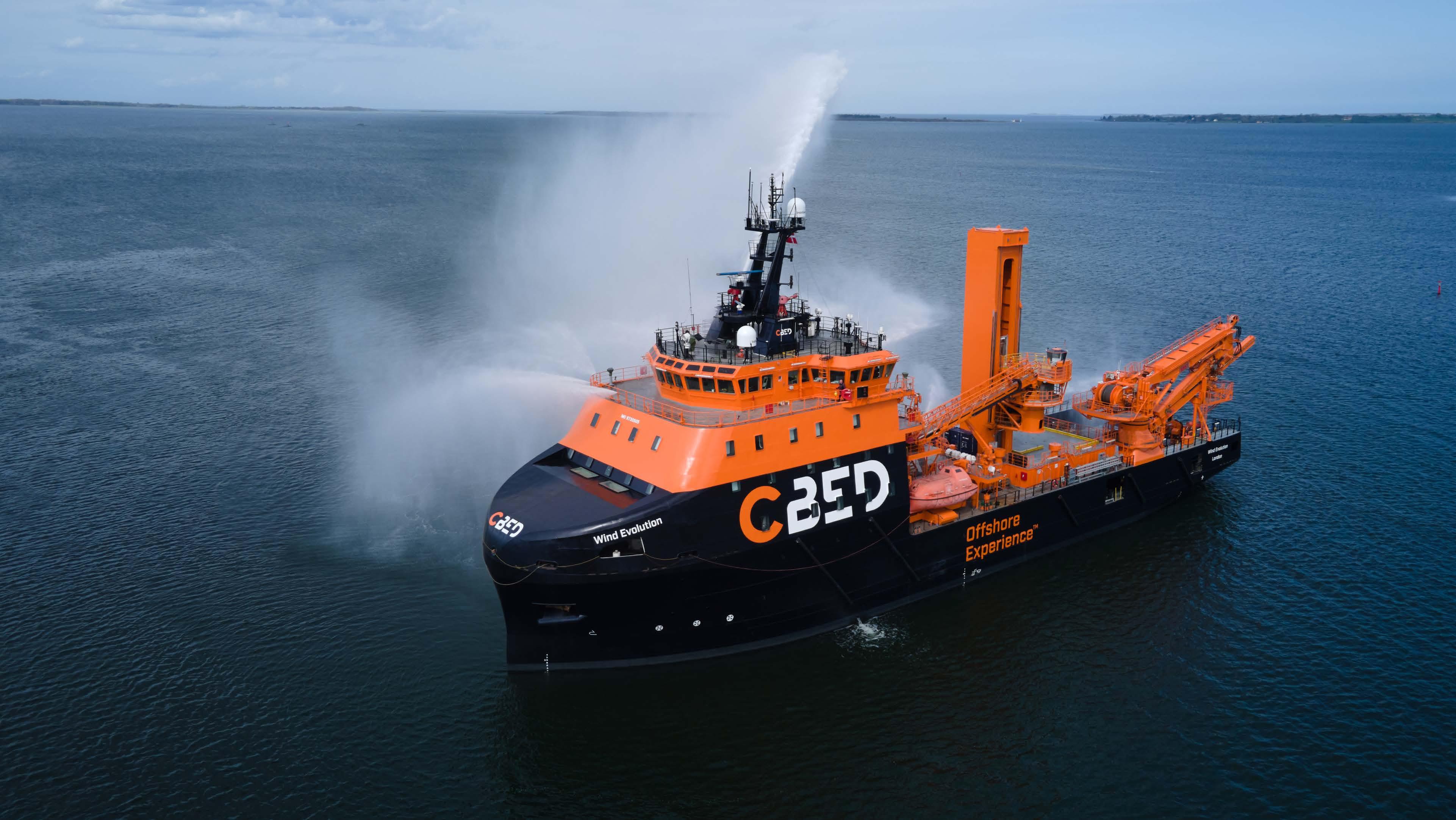
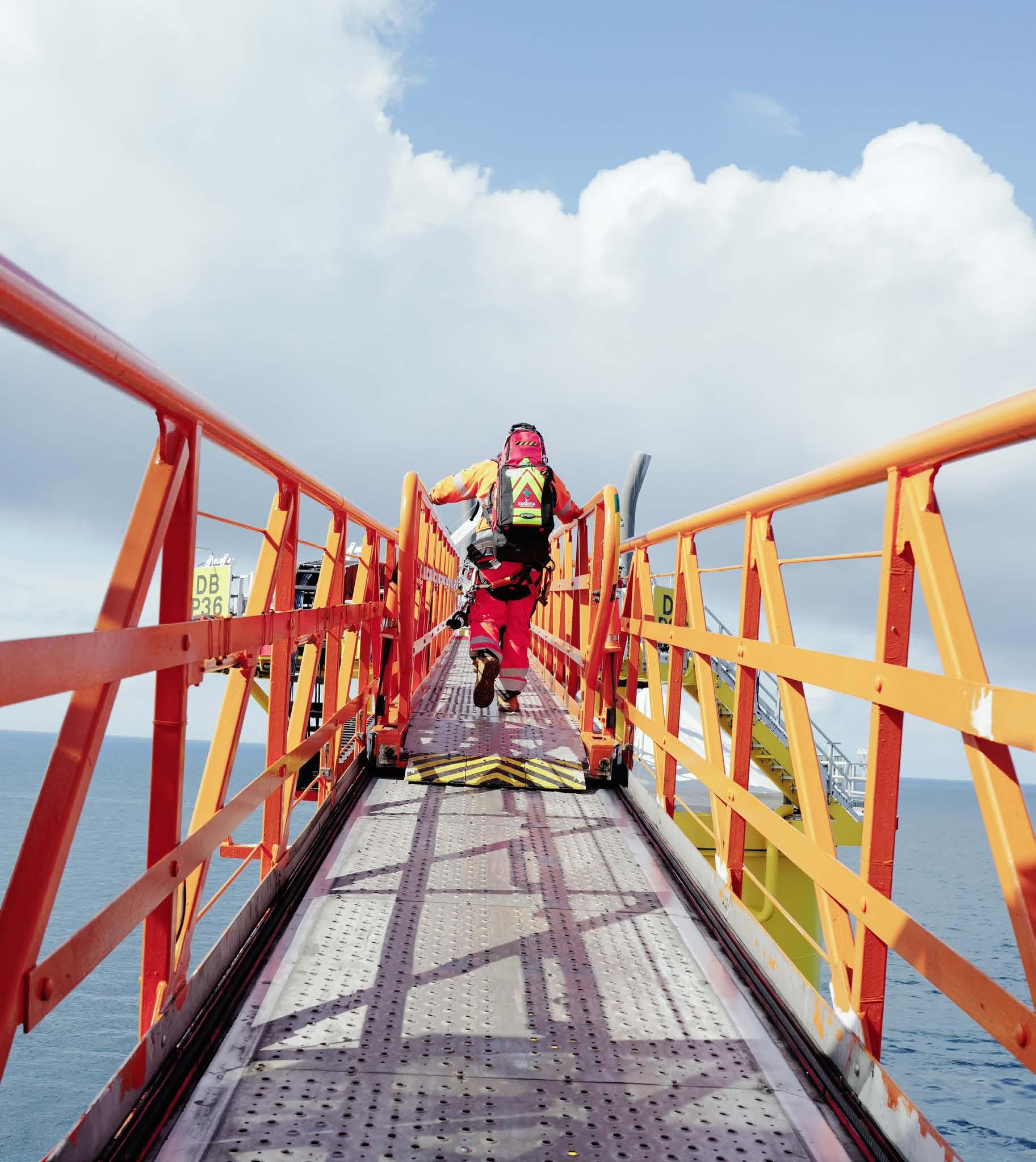
CBED takes pride in the way we conduct our business through excellent service, effective processes and systems. Our ambition is to become the ‘first choice’ and preferred partner to our customer and supplier portfolio.
The purpose of our environmental, social, and ethical requirements is to outline the standards we expect both ourselves and our business partners, contractors and suppliers to adhere to throughout the supply chain. We are committed to working with our business partners, contractors and suppliers to promote responsible and sustainable practices around the world.
In a global market vulnerable to high-risk transactions, we are consistently aligned with international regulations on sanctions, bribery and corruption and observe strict compliance when conducting enhanced due diligence on all vessels and counterparties.
All vessels in our fleet operate under a UK flag. Management of our ISM-certified Safety Management System (SMS) and daily operations onboard are outsourced to the subcontractor, Transnautic Ship Management, who is specialised within the area. This ensures CBED’s operation has a strong backbone and ensures compliance with the most recent laws and regulations.
ISO certifications
CBED has a formal Health, Safety, Environment and Quality management system. We are proud of the fact that since 2014, CBED has had accreditation to the following global standards across all our offices and operations:
• 45001:2018 Occupational Health and Safety Management
• 14001:2015 Environmental Management
• 50001:2018 Energy Management
• 9001:2015 Quality Management
Mandatory KYC procedures
Already in 2021, CBED rolled out mandatory Know-YourCounterparty (KYC) forms to all counterparties that we engage with. A 360-degree vetting is conducted which includes reviewing corporate management and ownership structures, identifying ultimate beneficial owners and any politically exposed persons.
In 2021, we took third-party risk management several steps further by applying additional and enhanced manual screenings and deep dives when performing due diligence on our counterparties. With this extended focus and dedication, we aim to set a high standard for third-party risk management across the industry.
Working to eliminate bribery and corruption
At CBED, we strive to lead the industry in instituting robust and transparent corporate governance, including strong anti-bribery and anti-corruption practices.
With a zero tolerance towards bribery and corruption practices in CBED, we actively work to build awareness and educate both our employees and counterparties to ensure full transparency in everything we do.
Since 2014, CBED has deployed annual Anti-Bribery and AntiCorruption (ABAC) e-learnings as a mandatory requirement for all onshore employees.
In CBED, we ensure a regularly updated and monitored GDPR framework aligned with the ISO 27001 standard. CBED’s departments work closely together to protect our data and to ensure compliance with data protection regulations through continuous review of security procedures, system access and handling of customer data. In close cooperation with law firm Bech Bruun, we continued sparring with them in 2023 on continuously strengthening our GDPR framework.
CBED currently does not process data or apply algorithms for data analysis as an integral part of our business strategy or business activities. Hence, we do not apply a data ethics policy.
During 2023, CBED has been preparing for the new EUwide legislation on cybersecurity, the NIS2 (directive
2022/2555) which will come into force from October 2024. The directive will set greater requirements on our general IT and information security and therefore we have been implementing measures for meeting the requirements of the new directive, such as reviewing our governance system to ensure that we comply with ISO 27001 standards.
Whistleblower
CBED has a great responsibility for how we handle whistleblower cases and for ensuring that anyone reporting incidents is adequately protected.
We have therefore implemented an external whistleblower line where all colleagues have access to report potential concerns anonymously and confidentially. In 2023, the line was handled by the law firm Holst Advokater, which ensured that all potential concerns would be handled confidentially and investigated independently. No whistleblowing concerns were reported in 2023.
In 2024, we implemented a new whistleblower platform which includes third parties as well as CBED colleagues.
CBED’s Code of Conduct applies to all counterparties whom CBED does business with, including business partners, subcontractors, and suppliers and outlines our requirements to the standards we expect them to adhere to throughout the supply chain.
In case of severe violations of this Code of Conduct, CBED will contact the supplier and address the matter to terminate the practice and open a dialogue to prevent future violations. In case of any severe violations of our code of conduct, CBED will terminate any contractual agreements with the supplier.
CBED takes responsibility for our value chain and to ensure a continued cooperation with our suppliers, we conduct regular supplier evaluations and audits of our subcontractors.
All suppliers in CBED go through a screening process which includes a supplier evaluation form. The purpose of the supplier evaluation form is to ensure that they follow the same high standards as CBED within HSEQ, compliance and how they conduct their business in general.
Bi-annually a group of CBED’s frequently used suppliers is evaluated on their performance. The evaluation is a standardised form with pre-defined criteria that enables CBED to benchmark the performance of the suppliers and take a preventive approach if a supplier is not living up to the standard set by CBED.
CBED has two long-term subcontractors who support the operation of our vessels. Transnautic Ship Management serves as a Technical Ship Management Company, and Crewplanet serves as our crewing agency. As these subcontractors are critical business partners for CBED, we conduct annual audits to ensure they adhere to all CBED’s policies and practices. In addition, every second year the audit takes place at the subcontractor’s premises when practicably possible.
Occupational Health And Safety Management
45001:2018
▪ We manage our business risks and provide a safe and healthy workplace.
▪ We have emergency procedures in place for both onshore and offshore operations.
▪ We have material safety data sheets for each of our products.
Environmental Management
14001:2015
▪ We manage the risks and impacts our business and operations pose on the environment.
▪ We understand our carbon footprint and seek to minimise our environmental impact.
▪ We manage our waste by recycling and proper disposal onshore & offshore.
In CBED, we believe that our ISO certifications tell our customers how we operate. CBED is dedicated to offering a world-class service. When entering into an agreement, our customers are guaranteed quality. We take all appropriate steps to ensure that we fulfil their requirements and that the highest possible level of service is provided.
CBED has a strong commitment to providing a safe working environment for all our employees, whilst also ensuring the safety of those who work with us. Protection to the environment is also at the top of our risk management framework and we take all reasonable precautions to ensure our business activities cause minimal impact to this.
CBED has a formal Health, Safety, Environment and Quality management system. We are proud of the fact that since 2014, CBED has had accreditation to the following global standards across all our offices and operations in Europe.
Quality Management
9001:2015
▪ We deliver consistent service across time zones.
▪ We guarantee the quality of our products.
▪ We have an efficient claims-handling process to provide a resolution if issues arise.
Energy Management
50001:2018
▪ We use data to make informed decisions about energy use and ensure operational reliability and sustainability in our offices and vessels.
▪ We minimise our vessel energy consumption (bunker fuel) through continuous monitoring and implementation of energysaving initiatives.
▪ We measure our resource consumption to identify areas of efficiency and improvement.